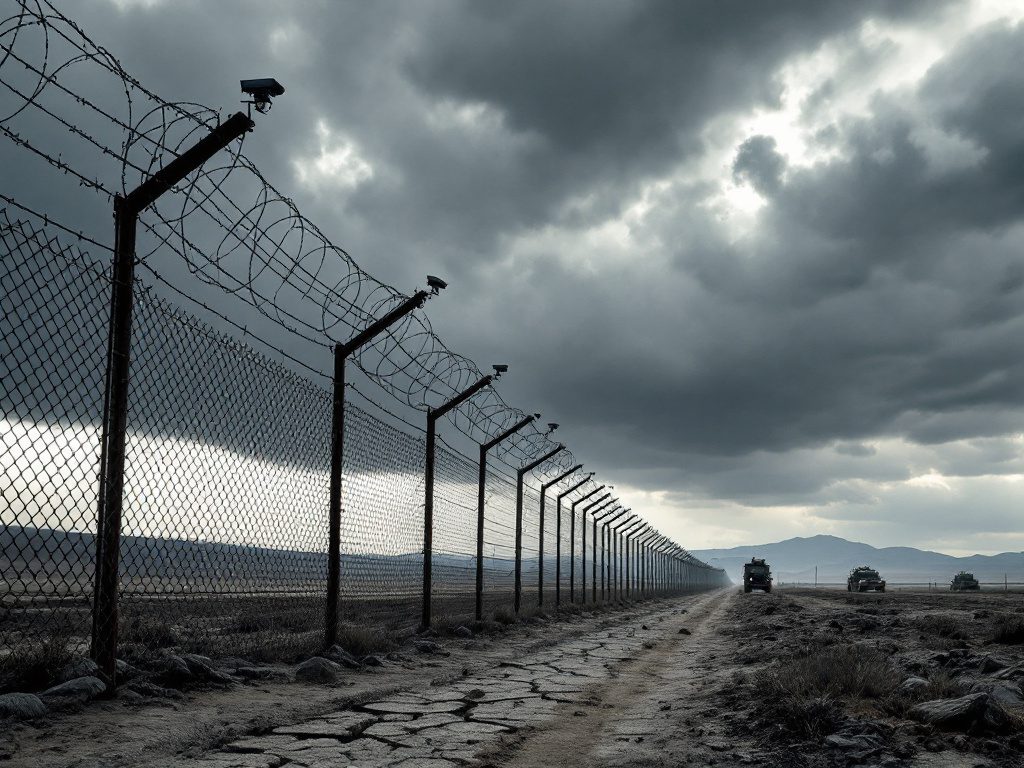Civilian Rights in the Crosshairs: The Rise of the Border Military Zone
A raw nerve has been struck along the southern edge of the United States. Federal authorities, wielding new powers, have charged 28 migrants with breaching a freshly minted military “buffer zone” spanning 170 miles of New Mexico’s border with Mexico. This strip, just 60 feet wide, yet extending across desolate high desert, now sits at the heart of a grave debate over fundamental civil liberties and the nation’s soul. The use of military power against civilian border crossers marks a dramatic escalation—one that seizes the attention of anyone with even a passing interest in constitutional rights or the fate of vulnerable people seeking a new life.
The facts are stark. On April 18, the Biden administration designated over 109,000 acres of federal land as part of the “New Mexico National Defense Area,” effectively expanding the military’s footprint. Immediately, warning signs went up in English and Spanish. The site is patrolled not by your typical border agents alone, but by active-duty U.S. Army personnel, who treat the corridor as an extension of Fort Huachuca in Arizona. While Army troops don’t conduct civilian arrests directly, they do temporarily detain migrants, handing them to Border Patrol or local police for processing and now, prosecution.
U.S. Attorney Ryan Ellison—who, tellingly, was sworn in the very day this defense area was created—filed charges against migrants in federal court, applying not just the default misdemeanor of unlawful entry, but a novel criminal charge: violating security regulations in a military zone. This change, experts warn, raises the stakes considerably. Convictions can mean up to a year behind bars or $100,000 in fines. As Defense Secretary Pete Hegseth bluntly stated, “It’s clearly posted. And when you ignore them, you will be prosecuted.”
From Border Politics to Martial Law: Context and Warnings
Beyond headline shock value, the militarization of this border zone signals a dramatic philosophical shift in U.S. immigration and security policy. Since the earliest days of immigration enforcement, civilian law enforcement and due process protections formed the backbone of American legal tradition. Now, a line is being blurred—one with a chilling historical resonance. Few moments in modern history conjure anxiety like troops policing civilians on home soil.
This policy did not emerge in a vacuum. Migrants and asylum seekers have met with ever more aggressive tactics from Washington in recent years, from the separation of families to the use of surveillance technology and bipartisan increases in border funding. Yet even some hawkish legal scholars pause at the precedent set by treating large swathes of American land as defense zones subject to essentially martial law. Lest we forget, the Posse Comitatus Act was designed to prevent just this kind of domestic military enforcement—barring the Army from acting as police outside of bona fide insurrection or national emergency.
Critics—including the New Mexico chapter of the ACLU—condemn what they call an “enhanced militarization” of both the borderlands and the lives of U.S. citizens living near them. By some legal interpretations, even Americans who cross the invisible line for legitimate reasons—herding cattle, visiting friends, accessing water—could be caught in the dragnet. According to ACLU of New Mexico director Peter Simonson, “The historical danger here is clear: empowering the military to police migration risks undermining the constitutional rights of everyone who lives in these communities.”
“History teaches us that when soldiers are asked to enforce civilian law, it is the vulnerable and the voiceless who pay the highest price—whether they were Japanese Americans in 1942, or desperate migrants today.”
A closer look reveals that, while military personnel technically refrain from making formal arrests, their presence as the first line of interdiction undeniably shapes the context and tone of border encounters. The move’s supporters—mainly Trump-era DHS and Pentagon officials—characterize it as a much-needed tool for deterrence and order. Yet that rationale stirs echoes of darker chapters in American civil liberties, like the WWII-era internment of Japanese Americans, when extraordinary powers became normalized under a banner of “national security.”
The Human Toll—and the Political Gamble
Policy at this scale is not measured solely in barbed wire or legislative text. It is counted in interrupted lives, divided families, and anxious communities. The DOJ’s new prosecutorial posture comes amid a surge in CBP apprehensions and fortified rhetoric from politicians demanding “100 percent operational control” of the border—a goal that has never truly been realized, even in the most draconian periods of U.S. immigration history.
The risks for everyday people living near these new zones are far from hypothetical. Ranchers and residents now wake up to troop movements and military vehicles on familiar land. According to a 2023 Pew Research survey, nearly 60% of Americans oppose the routine use of active-duty soldiers for domestic law enforcement, citing fears of excessive force and eroded due process. Civil rights attorney Linda Chavez told NPR last week, “We’re sliding down a slippery slope—from policing migration to policing whole regions, and soon, who’s to say where those lines are drawn?”
What does effective border policy look like, if not this? Most experts—whether from law, human rights, or national security—argue that lasting solutions must tackle root causes: poverty, violence, and instability in countries of origin, alongside targeted investment in domestic legal infrastructure. The endless expansion of militarized zones, with their Kafkaesque legal consequences, does little to change the fundamental calculus for people risking everything for a shot at safety or opportunity.
The story of these 28 prosecuted migrants is not just a chapter in border enforcement—it is a warning. America has choices to make about the limits of security, the meaning of justice, and the point at which protecting a border morphs inexorably into compromising the values we claim to defend. As the New Mexico buffer zone becomes precedent, the true test will be whether voters, lawmakers, and communities push back—fighting not just for their boundaries, but for the very character of the nation they wish to preserve.

